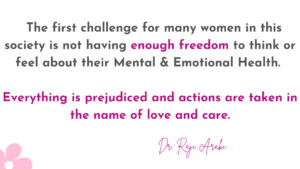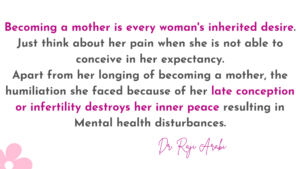Major challenges affecting Women’s Mental Health
Taking care of Mental Health is not exclusively for people who are suffering from Mental illness. When we talk about Mental Health, it is often considered a stigma even in this 21st century.
Besides that, talking about Mental Health for women is another taboo in this society. Many factors are affecting Women’s Mental health knowingly and unknowingly. It is crucial to be aware of it whomever you are. Let’s begin with Sadden Reality. {Dear Women & Trans-women, get aware!! Dear Men, Please understand!!}
Stop telling, “You are weak, eat well”
If a woman cries, has fatigue or feels low energy or doesn’t show any interest in anything or doesn’t like to go outside, or if she has trouble sleeping, Automatically every man and woman in the family concludes that she is not eating well, and that’s why she is suffering.
Furthermore, in some families, they are taken to Hospital and insisted to Doctor that the woman is not eating well, so please put some IV fluids. After taking her home, gave her two days rest and then the routine will be continued.
There is no one to ask her or listen to her problem. Pathetic point is, many women are not aware that they are having disturbances in their Mental & Emotional health and believe that they are having a physical weakness.
The first challenge for many women in this society is not having enough freedom to think or feel about their Mental & Emotional Health. Everything is prejudiced and actions are taken in the name of love and care.
“Ask her, Listen to her”
Factor affecting Women’s Mental Health:
Biological factors:
It is informed that Female hormonal fluctuations have a major impact on their mental health in every stage of life, starting from Puberty, every month’s menstrual phase, Pregnancy, postpartum changes, Lactation period, and Menopausal phase. Concluding that she is designed to go through these hormonal fluctuations throughout her life. These hormonal fluctuations can directly influence how she experiences her emotions and communes with her surroundings.
Without awareness, running her life itself is the biggest challenge because these biological factors play a major role in Socio-cultural factors which furthermore affect her mental health.
Major Life transitions:
You know, Getting married is the biggest transition for every man & woman. Unlike Men, Women are forced to face myriad cultural aspects of their belonging society like new responsibilities, environmental changes, intimacy, sexual doubts, sexual dissatisfaction, difficulty in confiding their pleasure & pain, physical and mental changes after coition, disturbed sleep, food culture, insecurities, the emotional and financial impact of dowries, status and many more.
These are the areas where their Mental health is deeply affected. If they are working women, some other additional factors pertaining to their profession, status, money, work schedule, and time are also involved along with the above factors.
Pregnancy & Delivering a baby:
Apart from their hormonal influences, their physical changes, food intake, sleep disturbances, anticipating delivery, and anxiety about the labor process directly affect their mental health.
In some societies, even in this 21st century, Women are expected to deliver a male baby. Funny right?!! It seems funny to see these kinds of illiterates…no!! Not the illiterates… They are idiots!!
Coming to the point, because of these idiotic myths and beliefs, women are entangled to live with emotional suffering.
Note: Only the male gene determines the gender.
Over to Delivery!!
People believe that too much physical work helps women with normal delivery. Absolutely not!! Physical exercise or work never alone causes normal delivery. Her Mental health is as crucial as her physical health to have a normal delivery.
Just think about it, apart from her anxiety about a delivery, she is in the place to worry about the gender and process of delivery.
Now After delivery!!
“Post-partum Psychosis” is real. Many women nowadays advocated that we too delivered babies, we too faced this phase, but we never propaganda about this post-partum depression. Why nowadays people are talking about post-partum depression in the name of awareness? It’s bullshit!!
Dear ladies, believe me, it’s real. You had faced it without any understanding. You were forced to suppress your emotions which reflected outside either in the form of physical suffering or in the form of relationship issues.
The attempt to create awareness is not to control the happenings but to regulate the happenings in a healthy manner.
1 in 10 women experiences depression while they are pregnant and 1 in 6 women experience depression during the first year after birth.
Menopause:
Welcome to Aunties board!! 80% of mother-in-law and daughter-in-law relationship issues happened as a result of mood swings either in daughter–in–law’s life transition events or mother-in-law’s peri-menopausal period. Hormonal changes happening during the time of menopause can lead to irritability and can contribute to Anxiety and Depression.
Negative Life experiences:
Infertility:
Infertility is at the top place which affects women’s mental health where the desire to be a parent is not fulfilled. When a girl is born, even in her childhood she shows her inborn desire to be a mother while playing with a toy. What she used to do?!!
Keeping a toy on her shoulder, “Listen, mama, eat this food dearly. Sleep well…Re…Re…Re…” and sing a lullaby. So to become a mother is her inherited desire. Just think about her pain when she is not able to conceive in her expectancy.
Apart from her longing, the humiliation she faced because of her late conception or infertility destroys her inner peace resulting in Mental health disturbances.
Perinatal loss or Miscarriage:
Grief associated with these losses is not taken considerably and left acknowledged. Loss is a loss!! No matter even if she already had one child. Because of a lack of consideration and hormonal influences, she feels devastated and her mental health is absolutely pulled down.
Disintegrated Relationship:
Women who are separated, divorced, or widowed are more likely to experience societal pressure, cultural pressure, and humiliation which directly affects their mental health. Furthermore, their experiences, their persistent feelings may lead to Anxiety, depression, and other mental illness.
Read also: Food for Depression
One easiest thing, we can do for them is, “Don’t judge them, Don’t question them, Don’t talk about them. If possible, Stay with them, Listen to them”
Abuse:
Abuse in any form, either emotional, physical, or sexual, their mental health to be totally muddled. It is purely because of their fear and belief that they don’t have any other option. As a result, they keep on exposing the same abuse and living with pain and distress.
Dear Girl, Don’t get afraid, there is a solution to every problem, find the right place or person, or organization and talk about it. Remember, you are born to live, not to suffer.
Gender identity Discrimination:
Transgender women and other gender-diverse people got affected by myriad factors, only because of their chromosomes. They are prone to experience discrimination, bullying, abuse, and exclusion.
Embracing their gender and including them with respect is our social responsibility.
Sexuality– is one of the important factors which affect women’s mental health nowadays. Women who identify as lesbians, bisexuals, and other sexualities experience higher rates of Anxiety and depression than heterosexual women. Talking to a medical professional definitely helps you.
Take away:
There are many more factors affecting mental health for women. The root cause is a Lack of Self-awareness and Self-love. Women are framed as love and sacrifice. Unfortunately, Sacrifice is dominating and love loses its own quality. That is a woman who sacrifices a lot even her whole self is considered to be a lovable woman in this society. Remember, when you want to share something, firstly you should have that thing. So when you want to love others, first love yourself. Dear women, you are lagging here. Focus that!!
Photo credits : Unsplash
Obesity Management and tips to lose weight at home
Menopause, Menopausal Signs and Symptoms, Menopause Management.
Imposter syndrome- Signs, roots and tips to overcome
Anger Management Strategies
Share this post: on Twitter on Facebook on LinkedIn







